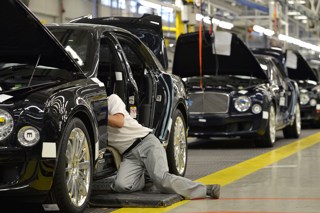 In the immediate aftermath of the Brexit vote, sterling fell to a 31-year low against the dollar. As AM went to press, the pound had recovered slightly against the dollar – taking it to $1.33 – but this was still 11.3% below its June 23 high point of $1.50.
In the immediate aftermath of the Brexit vote, sterling fell to a 31-year low against the dollar. As AM went to press, the pound had recovered slightly against the dollar – taking it to $1.33 – but this was still 11.3% below its June 23 high point of $1.50.
Mike Jones, chairman of ASE, said sterling’s exchange rate against the euro (currently €1.20) was even more critical to the automotive industry. He suggested it could lead to a fall in the number of vehicles coming to the UK, particularly if it dips below €1.10.
Jones said: “In the first instance, this will just reduce some of the froth of pre-registration activity. These are cars the dealers make very little profit on, if any at all, so we may see a rise in the return on sales percentage as a result.
“The danger for dealers would be in a slip into recession, although the business model is inherently robust with the opportunity for used cars and service work when new car sales become more of a challenge.”
Tarun Mistry, partner and head of financial services corporate finance at Grant Thornton, said: “As a result of a weakening of the pound we believe that new car subsidies from manufacturers will be restricted, leading to an increase in new car prices, which in turn will hold used vehicle prices up. This is dependent upon the overall level of demand and therefore the state of the overall economy.
He said sterling fluctuations also had implications for residual values.
“Reductions in the price of the pound will have a significant impact on sterling commodity prices for raw materials. If manufacturers need to hold prices to remain competitive this will possibly reduce their ability to support residual values.”
Asian manufacturers also face currency challenges. Between 2009 and 2012, when the Japanese yen was hovering around ¥128-¥135 to the pound, brands such as Honda, Mitsubishi and Subaru struggled to profitably import new cars from Japan, with a drop in sales as a result.
Since the referendum, the yen has dropped to ¥140 (down from almost ¥160 at its highest on June 23), leading to fears of a similar situation arising.
In the longer term, the risk of manufacturers withdrawing their manufacturing operations from the UK could also lead to rising vehicle prices and huge job losses.
Fears that Nissan’s 500,000 vehicle-per-year facility in Sunderland could be consolidated with the operation of its Renault alliance partner in mainland Europe have already been voiced.
Arnaud Deboeuf, a director of the Renault-Nissan Alliance, told the Financial Times: “(The Sunderland plant) is key for Nissan in Europe with the production of the Qashqai and the production of Juke, so in the short term there will be no impact”.


















Login to comment
Comments
No comments have been made yet.